Union budget 2015-Focused on growth

 The Union Budget 2015-16 is a positive budget focused on accelerating India’s inclusive growth and is a step in the right direction that brings lot of confidence on the new Government. The Budget reiterates major programs and initiatives that have been previously announced – Jan Dhan Yojana, Skill India, Swach Bharat, Make in India and Digital India. Speedy implementation of the national fiber optic network will enable more rural communities to benefit from the ecosystem of services that can make governance more effective. Budget focus on technology as a backbone for government processes, introduction of GST and improvements in financial infrastructure of the postal network of India, eCommerce companies are likely to get respite.
The Union Budget 2015-16 is a positive budget focused on accelerating India’s inclusive growth and is a step in the right direction that brings lot of confidence on the new Government. The Budget reiterates major programs and initiatives that have been previously announced – Jan Dhan Yojana, Skill India, Swach Bharat, Make in India and Digital India. Speedy implementation of the national fiber optic network will enable more rural communities to benefit from the ecosystem of services that can make governance more effective. Budget focus on technology as a backbone for government processes, introduction of GST and improvements in financial infrastructure of the postal network of India, eCommerce companies are likely to get respite.
The Budget is practical, balanced and growth oriented. The Government delivers on its promise of strengthening the infrastructure sector. It endorses a vision of India where there is a house for every family with 24 hour power, potable water and all accessible by road. Mobile that the Finance Minister referred to is indeed positive in a mobile-first, cloud-first India.
The Government delivers on its promise of strengthening the infrastructure sector and commitment to skill development to equip the nation’s youth to take advantage of economic opportunities, with a focus on job creation through the Make in India program, and providing gainful employment to India’s youth is commendable and a future oriented outlook. Innovative schemes of monetizing Gold, preventing leakages and corruption with direct transfer and Digital India initiatives and support to the startup ecosystem, the scheme for the alternative energy development and the direction towards GST are the steps in the right direction.
The much awaited implementation of GST by April 2016 is really encouraging .The reduction in tax on royalties for technical services will help greater technology adoption in industry and that is welcome. The Excise Duty differential of 11% on domestically manufactured mobile phones over imported phones will promote domestic manufacturing and create the necessary pull for investments from India and abroad into the industry and will realize the “Make in India” programme, with a positive note the reduction in tax on royalties for technical services will help greater technology adoption in industry and that is welcome. The Government however has to consider the service tax rates that have been increased from 12.36% to 14%, impacting Technology sector players.
 Adi Godrej, Chairman – Godrej Group
Adi Godrej, Chairman – Godrej Group
“Some of the steps taken for the long-term in terms of black money and others will be very useful. Some of the other announcements for the long-term also will be good. For example, the fact that FM wants to bring corporate tax rate to 25 percent in four years time is a good move. At the same time I think manufacturing has fallen between two stools because he doesn't want to give any new incentives to any sector of the economy because he wants to bring corporate tax rate down but this year he has not brought corporate tax rate, in fact corporate tax rate has gone up because the 2 percent surcharge which he announced he will charge on higher income individuals is evidently applicable to the corporate sector too. So, I feel that manufacturing will not get the boost we expected this ‘Make in India’ Budget to provide".
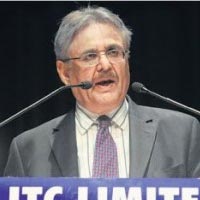 Y C Deveshwar, Chairman – ITC Ltd
Y C Deveshwar, Chairman – ITC Ltd
"FM has addressed issues of fostering growth with equity, boosting investments, creating jobs. Measures to eliminate black money are a bold step to curb the parallel economy."
 Uday Kotak, EVC & MD – Kotak Mahindra Bank
Uday Kotak, EVC & MD – Kotak Mahindra Bank
“Budget has strategic architecture embedded in it. There’s significant push to drive investments. It outlines social security architecture, so far a gap in the system. Incentivizing use of debit and credit cards and disinventivising cash transactions will ensure transparency.”
 N Chandrashekharan, CEO & MD – TCS
N Chandrashekharan, CEO & MD – TCS
“It is a Bold, far-sighted budget. It aims to make structural changes to drive corporate investment. A key signal is the commitment to Digital India. Extending digital financial infrastructure will spur India’s aspiration to become a “Smart Nation”.”
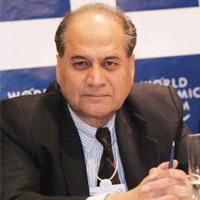 Rahul Bajaj, Chairman – Bajaj Auto
Rahul Bajaj, Chairman – Bajaj Auto
“One of the best budgets in the recent past. What is especially important is the proposal to enact a law on black money with penalty for tax evasion. Some may consider this a pro-corporate budget but in reality it is one for growth, savings, industrial development and for the middle class.”
 Alan D Souza, CEO - Vavia Technologies
Alan D Souza, CEO - Vavia Technologies
“The govt seems to have spoken of another 1000cr startup fund with no news about the previous 10000cr startup fund that was announced during the budget last year. Rather than announcing such funds, more focus needs to be given on how utilization of such funds have impacted job creation and then additional support that can be provided for the same. The proposal to reduce taxes for Tech startups from 25% to 10% is great news as this will really encourage tech startups in the country.”
 Ichiro Iino, Managing Director - Hitachi India Pvt. Ltd.
Ichiro Iino, Managing Director - Hitachi India Pvt. Ltd.
“The current Union Budget strives to drive the growth of the Indian Economy especially in the Social Infrastructure domain. We are all geared up to work towards transforming India into a self-reliant country by actively getting involved in fields such as Water, Urban Transportation, IT, Healthcare etc. and contribute to the overall welfare of the Indian society. The current Union Budget is very positive and promises growth for everyone.”
 Nigel Eastwood, CEO - New Call Telecom
Nigel Eastwood, CEO - New Call Telecom
“The Government delivers on its promise of strengthening the infrastructure sector. We, at New Call Telecom, strongly believe that small and medium sized companies hold the key to growth and by giving start-ups a boost will only expedite their growth story. The reduction in corporate tax from 30% to 25% over next 4 years is a welcome one. The reduction on taxes on technical services from 25% to 10% will also cut down costs for service providers like us who have focused plans for realizing the Digital India dream. Overall the budget looks realistic and a stepping stone to India’s growth story. I second the Finance Minister - India is about to take off."
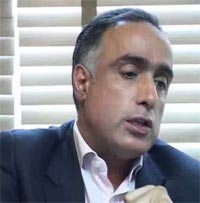 Sanjeev Sarin, Founder & CEO - Ozone Networks
Sanjeev Sarin, Founder & CEO - Ozone Networks
“In my view, the budget reflects a lot of confidence that the new Government has shown since the time it took charge of the office. It also projects a highly positive and optimistic roadmap for companies and investors looking to do business in India, thereby giving a boost of confidence to FDI in India and clearly sending out a signal that its simpler and lucrative to do business in India. It’s a budget for the working class and professionals. It gives a big boost to the farming and manufacturing sector and also encourages employment opportunities by giving preference and building a strong foundation to domestic manufacturing in India. A very encouraging step forward is the decision to induce investment by 70,000 crore in the infrastructure sector for FY 15-16. Health & Education has been a strong focus in the budget and the Government should be lauded for its decision to provide concession to senior citizen on medical expenses.”
 Vishnu Dusad, Jt. CEO - Nucleus Software Exports Limited
Vishnu Dusad, Jt. CEO - Nucleus Software Exports Limited
“We congratulate the Finance Minister on presenting a promising and reassuring Union Budget 2015. The focus on startups will surely bring in solutions to some of the most difficult problems making use of the soft infrastructure of Aadhaar and open APIs. It will encourage bright young minds to work on solutions in financial inclusion, healthcare, education, sanitation and all other sectors of economy. The positive measures that the Union Budget 2015 has focused are a step in the right direction viz. Banking the Unbanked and Funding the Unfunded, laying an equal emphasis on Financial Inclusion and the Indian entrepreneurial ecosystem. Last year, iSPIRT had shared that given the right direction, India has the potential to build a $100 billion software product industry by 2025 as against around $2 billion currently. We believe that this budget supports that direction towards setting up a world class IT hub, adding USD 13-14 billion revenues by FY15 and creating employment opportunities for millions. Also, the proposal of setting up a Rs. 1,000 crore fund for the Self Employment and Talent Utilization (SETU) mechanism- a techno-financial incubation and facilitation program is a welcome move that will not only support existing businesses but will also give an impetus to the new ventures in the technology sector, creating over a lakh jobs and create "billions of dollars" in revenue. While India has already emerged as the fourth largest start-up destination, with an affirmative support from the Government, we have the capability of reaching newer heights. Nucleus Software is proud to be a pioneer and supporter of the Make-in India and Digital India journey that India has embarked on.”
 Sumit Jain, Co-Founder & CEO - CommonFloor.com
Sumit Jain, Co-Founder & CEO - CommonFloor.com
"The move of allotting INR 1000 crore to tech start-ups is only a reiteration of the Government’s intent and purpose. However, the corpus, as such, is not substantial and we can only hope that there will be a fast and efficient disbursement of this fund. Mr. Jaitley in his speech referred to the points regarding more liberal system of raising global capital and ease of doing Business, which is encouraging as it would eventually create employment opportunities in the country."
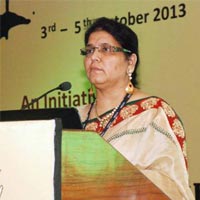 Sunanda Rajendran, Secretary General - Indo African Chamber of Commerce & Industries
Sunanda Rajendran, Secretary General - Indo African Chamber of Commerce & Industries
“I would like to give 9 out 10 to the FM on this budget. He mentioned lot schemes including social welfare through insurance schemes, swach bharat, building 6cr toilets lot of emphasis on agriculture sector with emphasis on improving the throughput and bringing in efficiencies are welcoming move. Additionally, rationalizing the corporate taxes, bringing the Indian corporate tax to more global levels ease of doing business, introduction of easier norms for setting up businesses, cutting the red tape path breaking scheme, funds availability for the poor and downtrodden and huge allocations to infrastructure will aid the economic growth of the country.”
 Amitabh Vira- CEO & Founder - NetProphets Cyberworks
Amitabh Vira- CEO & Founder - NetProphets Cyberworks
"The advent of GST will not only be a short term tool for the government to work on the fiscal deficit but also create a more competitive services sector in the long run. The Indian IT/ITeS industry welcomes this move. This move will also come as a boon to the growing ecommerce sector, since it has been struggling with taxation issues for a while now. The 1000 crore techno-financial incubation and facilitation programme is a much needed move by the government. Given the current entropy in the startup and tech industry, this will create a holistic platform for new ideas and thoughts to fructify. It would also create the necessary framework to engage our nation’s huge talent pool. "
 M P Vijay Kumar, Chief Financial Officer - Sify Technologies
M P Vijay Kumar, Chief Financial Officer - Sify Technologies
"The new government’s first full-year Budget Proposal is exciting with ‘Swachh Bharat Abhiyan’ and ‘Make in India’ as their key focus. Some of good initiatives include abolition of the wealth tax and increase of domestic transfer price from 5 to 20 crore. Additionally, the government's proposal to decrease corporate tax from 30% to 25% and removing the various exemptions which contribute to multiple tax disputes are some good steps in the direction of making tax administration simple. Increase in service tax is a step towards GST and serves as an indicator of the possible rate of GST which could be 100 basis points. Creating extensive awareness on social security schemes and making citizens to participate actively is a great initiative. Setting up exchange of trade receivables for MSMEs is remarkable. Monetization of dormant Gold is another good initiative.
Having said that, I was looking forward to hearing about the schemes similar to previous year's Digital India. On a scale of 10, I rate this year's budget a solid 7."?
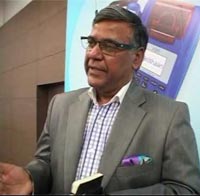 Pramod Saxena, Founder & MD - Oxigen Services
Pramod Saxena, Founder & MD - Oxigen Services
"In continuation of the PM Jan Dhan Yojana, we believe that this is an additional positive push to promote cash-less transactions and usage of digital money. The digitization of money at lower level and the JAM trinity (Jandhan, AADHAR and Mobile Access) will redefine and transform the economy to cashless. This will help in further alignment of the mobile wallets, cash in and cash outs and overall the mobile technology. We at Oxigen operate through Mobile, PCs, Biometric point of sale terminals and BCs. Furthermore, our cash in/ cash out ports will further assist us in materializing the cash less dream. We are very positive on this push and support digitization at all level."
 Devita Saraf, CEO and Design Head – Vu Technologies
Devita Saraf, CEO and Design Head – Vu Technologies
"Government’s make in India initiative has been initiated to encourage the local manufacturers. But in contrast I believe the budget has been quite disappointing. Presently, the import duty is extremely high. Even we import our TVs. We were hoping for some standard operating procedures whereas the excise duty has been increased on manufacturing. I believe that to support their own initiatives and the country, they should have done much more. Furthermore, we were also hopeful on the digitization aspect. But overall, there hasn’t been much considered to materialize Make in India and Digital India initiatives.”
 Srinivasan, CFO- Ventureast
Srinivasan, CFO- Ventureast
"As the general consensus goes, this year’s Union Budget is indeed a growth- oriented budget, particularly for the PE/VC investor community and start-up ecosystem in India.
The Permanent Establishment Safe Harbour provides a sense of comfort to fund managers for choosing India as the base for investment managers. It means that fund management activity undertaken in India by an eligible fund manager on behalf of an eligible offshore fund will not trigger business income taxation for the offshore fund in India. However, there is a qualifying provision that the overseas fund should have a minimum of 25 members, which would be challenging for a fund which have limited institutional investors.
Two encouraging points are that Minimum Alternative Tax (MAT) will not apply to foreign investors and the General Anti-Avoidance Rules (GAAR) applicability has been deferred by two years. Further, the reduction in corporate tax by 5% over 4 years will be welcomed by startups. But on the flip side, service tax has been increased from 12.36% to 14% which will put additional pressure on services providers."
 S.Rajendran, CMO - Acer India
S.Rajendran, CMO - Acer India
“We’re happy and welcome this positive budget which has defined a clear roadmap on many aspects addressing the need for stability in policy framework. Some of the bold announcements made by the Finance Minister and have a direct bearing on our sector - infrastructure spending, direct transfer to beneficiaries, committed date of April 01, 2016 for Goods & Service Tax (GST) and enhanced social security thrust will convey a reassuring message to potential overseas investors. However, we’ll need to review the provisions before any predictions could be made on the impact they will have on the sector. IT industry expected more from the budget. While some progress has been made towards addressing the inverted duty structure and dual Central Value Added Tax (CENVAT) structure for encouraging local assembly/manufacture of tablets and smartphones, keeping out PCs with the attendant increase in Excise duty/CENVAT from 12.36% to 12.5% in addition to the jump to 14% in service tax bodes ill for increasing demand for this category which is already suffering from woefully low penetration rates. We are eagerly hoping that with the clear direction spelt out, there would be more reform oriented policies and measures as the year progresses so the momentum for an accelerated GDP growth continues.”
 Jerold Pereira CEO - Videocon Mobile Phones
Jerold Pereira CEO - Videocon Mobile Phones
"We welcome the Union Budget2015 and believe it will give boost to local manufacturing as government increased duty benefits for domestic producers of electronic items, this is in line with PM Modi's “Make in India” initiative. The decision to expedite National Optical Fibre Network Programme (NOFNP) will lead to more Indian citizens going online. The reduction in basic customs duty on raw material inputs to optical fibre cables and manufacturing components of handheld devices will reduce the cost of this programme and fuel the demand for better services in online content delivery and communication. "
 Vivek Varshney, VP, and Head, Telecom - UST Global
Vivek Varshney, VP, and Head, Telecom - UST Global
“The Government has presented growth oriented and investor friendly budget. Allocation of 7060 cr. for 100 smart cities will give impetus to technology related spending. Government’s Digital India initiative to focus on broadband connectivity at village level with improved access to services through IT enabled platforms would go a long way in bridging the digital divide. Another welcome step is the setting up of National Rural Internet and Technology Mission for services in villages and schools, training in IT skills and E-Kranti for government service delivery and governance scheme. It is also encouraging to see the budget’s focus on employability and entrepreneur skills through setting up of Skill India program.”
 Pankaj Mohindroo, National President - ICA
Pankaj Mohindroo, National President - ICA
“The step up in the differential from 5% in the pre-budget dispensation to the current 11% is designed to create the necessary pull for investments from India and abroad into the industry and will realize the “Make in India” programme.
However, the Government will have to fine tune the differential keeping in mind that smuggling of finished mobile phones into the country from China has always been a big problem. The 11% differential when added to high VAT rate of 15% in major states will be very lucrative preposition for the grey market operators. The previous NDA Government in the 1999-2004 period had brought the Excise duty down to zero on mobiles to curb smuggling from China. Even without the differential, FDI flowed into India with an organized World’s largest factory in Chennai was set up by Nokia during this period only.
Currently, the mobile market has grown to a high of Rs 1 Lakh Crores with compound growth rate of 30% plus. The differential will ensure that hunger of the Indian consumer can be fed by domestic manufacturing. But this has to be done in a manner which does not result in price rise for the common man, specifically in the low price feature phone segment.”
 Toshendra Sharma, Founder & CEO, Wegilant - SINE IIT Bombay
Toshendra Sharma, Founder & CEO, Wegilant - SINE IIT Bombay
“This is certainly a move in the right direction for fostering a sound startup ecosystem in our country. Any assistance from the Government would be a shot in the arm for startups & small businesses. With support towards the self-employment, being a start-up we comprehend the importance of any kind of support and when it comes from our country’s government, we truly wish to deliver the best for the country and make a difference at large!”
 Sanjoy Sen, Doctoral Researcher - Aston Business School, UK
Sanjoy Sen, Doctoral Researcher - Aston Business School, UK
“The benefits to IT and ITES organisations following the budget will probably emanate more from some of the broader announcements more generically applicable rather than IT sector specific reforms. Also these would tend to be longer term gains for the sector rather than any "quick win" or windfall with immediate monetization.
First and foremost, the economic survey sets an immensely positive tone not just across all industries but even more so for the IT sector, which has been walking up the escalator throughout the relative slowdown - just that the economic growth "escalator" will now move faster, hopefully at near - double digit rates.
Secondly the reduction in TDS for royalties will encourage knowledge transfer and will be a very powerful element together with other skill - development initiatives announced today. It will truly help monetize the demographic dividend through skill development with a specific inclusive focus on people from rural areas.
Thirdly all industries including IT and ITES will benefit from the eventual lowering of the corporate tax rate over the next four years.
More directly, the good progress reported on Digital India will enhance domestic market opportunities for the sector.
Finally, tech startups now get the focus as well as the fiscal incentivisation through the proposed Rs 1000 crore investment, together with the new mechanism for techno, financial and incubation platform assistance. This will certainly garner more innovation in the IT and ITES sectors, clearly with monetization opportunities.”
 Alok Ohrie, President and Managing Director - Dell India
Alok Ohrie, President and Managing Director - Dell India
"We’re glad to see a positive budget announced by the Hon’ble Finance Minister. This reaffirms the reform stand taken up by the government and its commitment to investors here. Some of the forward looking statements made by the Finance Minister have a bearing on our sector – exemption of SAD, reduction of Basic Customs Duty on electronics components, inputs etc., ease of doing business, encouraging startups and the big boost to healthcare. However, we’ll need to review the notifications before any predictions could be made on the impact on the sector. The economic survey has indicated that a clear political mandate for big bang reforms coupled with a benign external environment can propel India to a double digit growth trajectory. Today’s announcement only goes to support this. Dell has been a major contributor to the IT sector in India. Apart from being India’s most trusted technology brand, Dell’s manufacturing facility for electronics has been shouldering the ‘Make in India’ mantle for more than 7 years. In addition, we’ve been eagerly awaiting these announcements that boost the manufacturing capabilities of the country that will eventually grow the sector.”
 Ravi Swaminathan, Managing Director - AMD India & Corporate Vice President, AMD South Asia
“The announcements made in Union Budget 2015 are certainly a step in the right direction to boost growth of the technology sector and also further drive investments.
Ravi Swaminathan, Managing Director - AMD India & Corporate Vice President, AMD South Asia
“The announcements made in Union Budget 2015 are certainly a step in the right direction to boost growth of the technology sector and also further drive investments.
The exemption of all special additional duty (SAD) on inputs/components used in the manufacture of personal computers is a significant step towards integrating India into the global supply chain enhancing the technology capabilities in hardware.
Further, the thrust on NOFN will provide a tremendous opportunity to bring Digital-India's vision to the fore. The opportunity arising from the enhanced connectivity will address the issue of enhancing infrastructure penetration in the country. Broad band connectivity, improved access to services through IT enabled platforms, greater transparency in Government processes and special focus on supporting software product start-ups is noteworthy initiatives towards enabling not only the industry but also citizens at large.”
 Jitendra Guha, Chief Operating Officer - Neev Energy
Jitendra Guha, Chief Operating Officer - Neev Energy
“The Finance Minister today has done a fantastic job providing impetus to the LED lighting industry through a cut in excise duty. Moreover this budget creates an enabling environment and promotes innovation. Both of these aspects will make PM's 'Make in India' concept into reality.”
 Rakesh Deshmukh, CEO and Co Founder - Firstouch
Rakesh Deshmukh, CEO and Co Founder - Firstouch
“I would like to thank Finance Minister Shri Arun Jaitley for the special attention on domestic manufacturing. It’s a great budget for mobile phone manufacturing. The reduction in corporate tax from 30% to 25% over a four years period is very appreciable. The move to reduce the burden on younger companies by reduction in the rate on income tax on royalty and fees for technical services to 10% from 25% is very positive. Rs 1,000 crore for promotion of startups particularly in the technology sector brings great hope and encouragement for startups like us to develop more patent technology innovations to help promote “Make in India” & “Made in India” initiative. This time budget is for betterment of the entire economy.”
 Raju Vanapala, Founder and CEO - LearnSocial.com
Raju Vanapala, Founder and CEO - LearnSocial.com
"This time, the Finance Minister has given special attention to the IT and ITes sector. The announcement of Rs 1000 crore for promotion of start-ups is a highly positive move. We feel that the new government has presented a progressive budget, which will help in creating an investor-friendly environment and attract more foreign and domestic investment in the IT sector. As we all know, a boom in the IT Industry with advanced technology leads to direct growth of the economy. Hence, the government has laid a special focus on this space. The new mechanism known as Self Employment and Talent Utilisation (SETU) will be a techno-financial incubation and facilitation programme to support all aspects of start-up business and other self employment activities particularly in technology-driven areas. This too will open more avenues in the sector and be a veritable shot in the arm."
 Amit Bansal, CEO - HealpingDoc.com
Amit Bansal, CEO - HealpingDoc.com
“The increased healthcare budget allocation is step in the right direction but the amount is still far too less to built an effective and credible public healthcare system in India. The good news is that healthcare has started to get the due attention.
The increase in tax exemption limit for health insurance will have significant impact on the penetration of health insurance in the country. This would help corporates to offer a wider range of health packages, and would go further to reduce out-of-pocket health spending.”
 Sanjoe Jose, CEO - Talview.com
Sanjoe Jose, CEO - Talview.com
“The budget allocation for startups should be used to promote startups in Tier 2 cities and beyond. This can lead to significant generation of quality employment at par with city counterparts for youngsters in these regions. Areas to be focused should be technology, commerce and education/training.”
 Diwakar Chittora, CEO - Intellipaat.com
Diwakar Chittora, CEO - Intellipaat.com
"It is good to see a big step from Modi government towards boosting startups. IT indicates very clearly Indian government wants to build healthy environment for startups while is prevailing in US and Singapore. If we are look at this allocation in details there is lack of clarity how these funds will be allocated, what is the duration for this will be available , what is the procedure to get the funds and what kind of startups are eligible and what is the slab of funding .
There are still some cases where government is doing this work but it’s of no use for many. To give an example, we recently spoke to STPI Jaipur they run a program whose objective is to boost startups under name of Startup Oasis which is in joint venture by RIICO and we approached them for using their facility for our office. They said we are not startup as our company size is 20 people and they denied providing us their facility. They have a facility of sitting capacity of at least 30 – 40 people free from last 6-8 months but still they are not interested in giving them to us.
Big problem here is to address even though government allocates budget but there is no clarity how to utilize, who can utilize, who is the right authority to take decision and what is the definition of startup?"
 Ashutosh Modi, Executive Director, EntrancePrime.com
Ashutosh Modi, Executive Director, EntrancePrime.com
“A brilliant, well thought budget for all sections of society and businesses. Measures targeted on black money are very bold and long due. My top picks from the budget - electrification of 20,000 villages, digital India initiative to connect villages with technology, introduction of new IITs, IIMs and other premier institutes of higher learning, ensuring a senior secondary school within 5 KMs reach for every child, 1000 Crores budget for promoting technology startups, reduction of tax for royalty fees on technology services, initiatives like Nayi Manzil & Pradhanmantri Vidya Laxmi Scheme to promote education & skill development in India, Reduction of corporate tax by 5% over 4 years.
However, execution and enforcement plan for influx of larger funds in schemes like MNREGA will be interesting to read. As expected, increase in service tax to make way for GST will be hard of Indian pockets. We were expecting a reduction in ROI for Education loans; however, some of it is taken care of with Pradhanmatri Vidya Laxmi Scheme.
Looks like an immensely progressive budget on face value, as an Ed-Tech company we see some really good opportunities coming out of this budget, look forward to details and execution plan.”
 Ramit Sethi, Founder and chief mentor - Career Co
Ramit Sethi, Founder and chief mentor - Career Co
"FDI would be favorable for us as it will generate job opportunities and help people to find their career. But we are not happy with 14% tax on companies. And also, the amount allocated for startups is too less.”
 Abhinav Choudhary, Co-Founder, Smartprix.com
Abhinav Choudhary, Co-Founder, Smartprix.com
"Budget 2015-16 may prove to be A Game changer for tech startups in India. According to Economic Survey 2014-15 Indian Tech startup landscape to be in the mode of hyper-growth. In line with the growth, allocation of 2000cr for startups will definitely be seen as a positive sign from Govt.
FM announcement of reducing corporate tax from 30% to 25% in the next 4 years will increase the expenditure power on marketing and technology of Smartprix.com.
– An online comparison shopping website and creation of more jobs in the technology sector is expected in the upcoming years. Reduction in the rate of income tax on royalty and fees for technical services from 25% to 10% is a welcome move.”
 Karan Mehrotra, Co-founder & CEO - Localbanya.com
1) Goods and Services Tax (GST) - We would've preferred implementation of GST sooner than 1st April 2016 to allow a consolidation in tax structures across states, goods and services utilized.
It would also allow for better financial governance by eliminating the need to customize finance structures in different states basis the prevalent VAT structures.
2) Service tax increase to 14% - With timeline for implementation of GST being 1st April 2016, the increase in service tax will impact our margins. This is not a welcome move.
3) Employee Provident Fund contribution by employees being optional - This is good news for our blue collar staff, as it allows for more cash in hand hence translating to better motivation
4) Self Employment and Talent Utilization (SETU) - The Techno-Financial, Incubation and Facilitation Programme will be an interesting development for us to follow. With an allocation of Rs 1000 crore we are keen to see how this would be implemented. The opportunity lies in improving our technology infrastructure with new businesses attempting to improve processes, platforms and boosting efficiency with technology.
5) Raising the Income Tax exemption to Rs 4.4 lakh would be a welcome development for the semi-skilled staff.
6) Streamlining FDI with composite caps is a good move; however we expected more clarity on FDI in multibrand retail.
Karan Mehrotra, Co-founder & CEO - Localbanya.com
1) Goods and Services Tax (GST) - We would've preferred implementation of GST sooner than 1st April 2016 to allow a consolidation in tax structures across states, goods and services utilized.
It would also allow for better financial governance by eliminating the need to customize finance structures in different states basis the prevalent VAT structures.
2) Service tax increase to 14% - With timeline for implementation of GST being 1st April 2016, the increase in service tax will impact our margins. This is not a welcome move.
3) Employee Provident Fund contribution by employees being optional - This is good news for our blue collar staff, as it allows for more cash in hand hence translating to better motivation
4) Self Employment and Talent Utilization (SETU) - The Techno-Financial, Incubation and Facilitation Programme will be an interesting development for us to follow. With an allocation of Rs 1000 crore we are keen to see how this would be implemented. The opportunity lies in improving our technology infrastructure with new businesses attempting to improve processes, platforms and boosting efficiency with technology.
5) Raising the Income Tax exemption to Rs 4.4 lakh would be a welcome development for the semi-skilled staff.
6) Streamlining FDI with composite caps is a good move; however we expected more clarity on FDI in multibrand retail.
 Krishna Lakamsani, Founder & CEO - IPay Tech India Pvt. Ltd.
Krishna Lakamsani, Founder & CEO - IPay Tech India Pvt. Ltd.
"Govt allotted 1000 cr for startups but it has to be more clear in how this fund is going to be deployed last govt also allotted desperate fund for startups but it did not reach to its potential because of lack of understanding in govt officials how and where to deploy.
If govt is focussed on startup tax when they raise investment it would help startups but there is no view on that As us govt did American Dream act giving employers to benefit when they hire new employees it will increase and help startups to hire there are no incentives specific to startups." Sanjay Kapoor, Chairman - Micromax Informatics
Sanjay Kapoor, Chairman - Micromax Informatics
“The Union Budget 2015-16 was very critical as it outlines new government’s commitment to reinvigorate the economy, kick-start investment cycle and also maintain fiscal prudence. They have the advantage of a stable political regime & lower inflation, courtesy oil prices! In the light of this two things that I expected from the budget were growth & infrastructure enhancement, including the Digital infrastructure like access, backhaul & storage. My first reaction after hearing the budget speech of Finance Minister is that government is making a concerted effort to ‘listen’ to the stakeholders. It's a sincere approach to problem solving with growth, competitiveness, inclusiveness, realism & long term transformation at the core.
If we reach the forecasted levels of 8.00-8.50% GDP growth we will not only be the fastest growing economy in the world but would be growing discretionary incomes and thus the domestic consumption. Though, there could be some disappointment with the fact that the set targets on curtailing the fiscal deficit will not be met, but I guess Finance Minister is being honest & pragmatic here still outlining a very measured, but positive approach for the future.
There is an undoubted focus from our Government on Infrastructure development both physical and digital but the task in hand is very arduous. Allocations are still small and our execution track record as a nation is poor. We will need to really attract global funds & resources to make this happen and the budget is pressing hard on transparency & ease of doing business in India to attract large infrastructure investments. On the digital side the vision is grandeur but the modus operandi looks flaky. The success will lie in blemish less execution. It will also be an acid test for the PPP approach, which many of us are firm believers of. Policy makers need to be clear that, getting this right is not a project, company or industry issue but an issue about India's future competitiveness.
As the global standards are going up, investment in National Skills Mission planned to empower youth, and investment of Rs 15000 crore schemes to skill rural India is a heartening move.”
 Amar Babu, President - MAIT (Manufacturer Association of Information Technology) and Managing Director - Lenovo
Amar Babu, President - MAIT (Manufacturer Association of Information Technology) and Managing Director - Lenovo
“Budget 2015 is a balanced budget that touches upon many areas of infrastructure, universal social security vision, insurance for all, education among others. From an IT industry perspective, it is a mixed bag with the inverted duty structure being finally addressed with the removal of SAD on all components. The removal of customs duty on components and concessional structure of 2% without CENVAT credit are positive steps to encourage tablet manufacturing in India. However it disappoints as no initiatives have been taken to increase PC manufacturing and promote exports. In this budget, we might have missed an opportunity to drive 'Make in India' in computers.”
 Khwaja Saifuddin, Senior Sales Director - South Asia, Middle East and Africa - WD
Khwaja Saifuddin, Senior Sales Director - South Asia, Middle East and Africa - WD
“The budget carries forward the government’s vision of Digital India and Make in India, and had some encouraging announcements especially regarding the development of infrastructure, employment generation and training of the youth. The support that is likely to be meted out to start-ups and SME’s through MUDRA Bank is expected to help the existing 5.77 crore small business units in the country expand their operations besides assisting new start-ups. The proposed reduction in the rate of income tax on royalty and fees for technical services from 25% to 10% will empower small businesses and start-ups digitally and make them important contributors to the Digital India initiative. Similarly, steps taken to enhance the employability of the youth through National Skills Mission and Deen Dayal Upadhyay Gramin Kaushal Yojana will result in the industry having an educated and trained workforce, a must for the Make in India initiative to progress. As the Financial Minister mentioned, this would turn ‘job seekers’ into ‘job creators’. Besides this, the proposal to reduce the basic rate of Corporate Tax from 30% to 25% over the next four years is a welcome move. Not only will this make the business environment in the country more lucrative, it will also lead to higher investments, job creation and growth.”
 Altaf Halde, Managing Director - South Asia, Kaspersky Lab
Altaf Halde, Managing Director - South Asia, Kaspersky Lab
"Overall the budget is well structured. The announcement regarding bridging the digital divide between the urban and rural India is a welcome move. The announcement of allocating Rs 150 core to create world class IT hub in India under the Atal Innovation Mission is very encouraging. Skill development also got a special mention in the budget aiming the youth to be entrepreneurs rather than job seekers. This was followed by the announcement on supporting the startups. For IT sector, this announcement will for sure be a boosting one.
The rationalization of service tax by including education is a good move. The increase will however impact our software sales. The lack of infrastructure development was a concern and it is well addressed in this budget with clear road maps and allocation. This will contribute to the overall development of the country. Reduction in corporate tax is also encouraging. The affirmation in the speech of Finance Minister Mr. Arun Jaitley, addressed the lost confidence among corporate India."
 Sunil Khanna- President and M.D. - Emerson Network Power India
“We welcome the Union Budget 2015-16 as a pro-people and growth oriented budget. On the corporate front, the focus on infrastructure and the desire to make taxation regimes simpler as well as deferring GAAR by another two years, is a welcome addition. We look forward to a long-term and sustainable growth path as set by the honourable finance minister. Specifically from the perspective of Emerson Network Power, the plan for investment in infrastructure and enhanced rate of GDP growth at 8% for the next two years will augur well, spurring business momentum. We are particularly excited with the emphasis laid on the renewable and solar energy space as this will bolster investment in the power generation space and will drive overall growth for the economy since energy is key to 24x7 functioning of businesses.”
Sunil Khanna- President and M.D. - Emerson Network Power India
“We welcome the Union Budget 2015-16 as a pro-people and growth oriented budget. On the corporate front, the focus on infrastructure and the desire to make taxation regimes simpler as well as deferring GAAR by another two years, is a welcome addition. We look forward to a long-term and sustainable growth path as set by the honourable finance minister. Specifically from the perspective of Emerson Network Power, the plan for investment in infrastructure and enhanced rate of GDP growth at 8% for the next two years will augur well, spurring business momentum. We are particularly excited with the emphasis laid on the renewable and solar energy space as this will bolster investment in the power generation space and will drive overall growth for the economy since energy is key to 24x7 functioning of businesses.”
 Aloke Ghosh, CFO & CS - Blue Star Infotech
Aloke Ghosh, CFO & CS - Blue Star Infotech
“It is encouraging to see that the Union Budget 2015 had a special focus on PM‘s ambitious Digital India initiative. The JAM trinity of Jan Dhan, Aadhaar, Mobile & GST can prove to be game changing reforms taking forward the financial inclusion programme and smoother, seamless transfer of subsidies to the intended beneficiaries. The budget looks at not only creating new jobs, but also incentivizing self employment and entrepreneurship. It will introduce more competition, innovation and bringing global expertise and technology giving a boost to the 'Make in India' programme. Its success is inextricably dependent on creation of skilled workforce. The National Skills Mission will enable skill development across several sectors and will help bridge the skill gap and make workforce sustainably employable. Also, the removal of Special Additional Duty on IT products provides relief and addresses the issue of inverted duty structure.”
 LC Singh, Vice Chairman & CEO - Nihilent
LC Singh, Vice Chairman & CEO - Nihilent
“We are delighted with the Union Budget 2015 which emphasizes on education, pensions, job creation, infrastructure and creating an entrepreneurial culture in the IT sector. The GST will put in place indirect tax system by next financial year while also bringing greater transparency and tax inflows. The other good news is the decision to reduce corporate tax over next four years. These are crucial moves to improve ease of doing business and we welcome them. The threshold for transfer pricing has been increased to Rs.20 crore. If this is coupled with simpler and clearer overall transfer pricing, investment will receive a boost and increase investor confidence. If the definitions of royalty are aligned with international practices, the country’s software sector will be at par with the global norms and standards.”
 Shirish Deodhar, Co-founder & CEO - Sapience Analytics
Shirish Deodhar, Co-founder & CEO - Sapience Analytics
“Spread a large number of seeds even in an unfriendly environment, and you will get a few trees. A conducive environment will result in a forest. The start-up fund, a simpler regulatory environment, ease of doing business, provides the seeds and environment that can lead to a large number of successful companies. Job growth is inevitable in a fast growing economy. Small businesses make up 99.7% of U.S. employer firms, 64% of net new private-sector jobs, and 49.2 percent of private-sector Employment. A lot of this has to do with the ease of doing business.
India has perhaps one of the largest ever young population in the history of mankind. The young by their very nature are willing to dare provided the opportunities exist. Unleash their entrepreneurial potential, and India can become unstoppable.”
 Bhaskar Pramanik, Chairman - Microsoft India
Bhaskar Pramanik, Chairman - Microsoft India
“The Finance Minister has presented a broad-based Budget focused on accelerating India’s inclusive growth. The Budget reiterates the major programs and initiatives that have been previously announced – Jan Dhan Yojana, Skill India, Swach Bharat, Make in India and Digital India.
The Budget retains the focus on financial inclusion, education, health and agriculture. It has increased focused on infrastructure development, housing and manufacturing in India. Overall, Budget 2015 is wide in its scope and takes into account the interests of diverse sections of society – middle class, farmers, youth, aged and the disabled. It endorses a vision of India where there is a house for every family with24 hour power, potable water, and all accessible by road, and where at least one member of the family is employed. And all by 2023, when India celebrates its 75th year of Independence. The FM also talked about building a better social security system for its citizens to provide financial security.
The budget talked about financial discipline, a monetary policy framework with RBI that will keep inflation at less than 6%, but look at possible double digit growth. The FM is looking at reducing the fiscal deficit to 3% but in three years’ time to release additional investments.
The focus on infrastructure and housing investments is good, as it will kick-start the economy and have a ripple effect across all Industries. The FM understands the need to kick start infrastructure projects through increased investments, the need to revitalize PPP with the GOI taking additional risk. The focus on technology as a backbone for government processes and systems is the right approach example GSTN, JAM was stressed.
The Government has recognized the need to support startups, and incubators and has acknowledged that a culture of innovation needs to be fostered. Budgetary allocations for incubators, a mechanism for supporting self-employment and talent utilization will allow startups and MSMEs to access the funds and talent, creating new avenues for growth and employment.
We must however hold the Government accountable for delivering on their budget promises. Many of the announcements made in previous budget, which were geared to minimize/resolve transfer pricing litigation are yet to be implemented. It is nice to make a mention of the measures for dispute resolution in the speech, but the key is implementation.
We will also need to see if some of the other Tax related concerns of the IT and ITES sector have been addressed. These include resolving ambiguities in taxation of software products and services. In that context, the service tax rate going up is a concern, because of the impact it could have of driving people to use pirated software. Especially, because of the dual tax on software – the net tax rate for software is above 20%.”
 Somesh Chandra, Chief Operations Officer & Chief Quality Officer - Max Bupa
Somesh Chandra, Chief Operations Officer & Chief Quality Officer - Max Bupa
“The Union Budget 2015-16 is a breakthrough budget and sets pace for fast growth economic trajectory through a robust financial framework. We are delighted that the budget has fulfilled the wish list of the health insurance sector and delivered on our long standing demand, of increasing the tax deduction limit under section 80D. Increasing the tax deduction in health insurance premium from Rs. 15,000 to Rs 25, 000 and up to Rs 30, 000 for senior citizens will improve affordability, accessibility and awareness of health insurance. Health benefits for senior citizens will facilitate comprehensive health coverage for the elderly and aid tax rebate. The accident insurance for rural and BPL population with annual premium of Rs. 12 showcases focus on affordable healthcare provisioning. This will boost health insurance penetration which is currently under 5% and mostly restricted to the urban areas, stimulate industry growth and encourage individuals to raise their health investment. We are confident that the budget will bring macroeconomic stability by conquering inflation, enable equal economic opportunity and lay a favorable roadmap for double digit economic growth.”
 Soon Kwon, MD - LG India
Soon Kwon, MD - LG India
“Overall, the budget is forward looking, progressive and practical, with a very clear direction for future. It reflects Government’s focus on increased investment in infrastructure growth and generating skill based employment. We welcome the changes in taxation policy, with the reduction in corporate tax over four years and rationalization of custom duty. The determination towards GST and the proposed implementation will boost the industry through the state of art indirect tax system. Efforts being made by the current government towards achieving its vision of ‘Make in India’ policy is evident in this budget and hopefully it will turn manufacturing in India into a more profitable and business-friendly proposition. Measures to curb black money, job creation through revival of growth and investment will benefit middle class tax payers.”
 Anirudh Dhoot, Director - Videocon
Anirudh Dhoot, Director - Videocon
“The 2015 budget is a balanced one, setting long term goal for better economy by keeping fiscal deficit target 3.6% and implementation of GST from April 2016.
The thrust has been given on infrastructure and social security. The postponement of GAAR is a positive relief and reduction in corporate tax form 30% to 25% in next four years will help industry to grow. Further thrust has been given on ‘Make in India’ where the basic custom duty on imported raw material has been reduced. This will boost assembly and value added manufacturing in the country. Reduction in the basic custom duty to zero from 10% on Back Light unit module used in LED panel manufacturing and Organic LED TV, also reducing duty on magnetron used in microwave oven are welcome steps.”
 Rodney Noonoo, CFO - Xerox India
Rodney Noonoo, CFO - Xerox India
“The Union Budget 2015-16 is a positive budget and step in the right direction. I appreciate the fiscal discipline and intent to reduce the fiscal deficit that stood at 4.5% of GDP in 2013-14 to 4.1% for the financial year 2014-2015 and subsequently reduce it to 3.6% in 2015-16 and to 3% in 2016-17. Overall I see a spirit of enablement, long term growth with announcements of multiple schemes aimed at bringing a change in the economic and social ecosystem that includes job creation, skill development, bridging the social divide etc.
The efforts on overhauling India’s business environment and boosting the country’s presence in the global map of ease of doing business are commendable. Right from cleaning up the links to tightening of processes and stringent laws for eliminating black money, monetizing gold-Sovereign Gold Bond will have a populist sentiment around it. The commitment to further this process through online central excise and service tax registration in two working days, issuance of digitally signed invoices and maintenance of electronic records and cutting down of paper work and red tapism will be a significant move in digitizing India and IT industry players like us will look at working more closely with the Government on such projects.
The government had promised to make it easy to do business in India and the intent is evident in the budget. The announcement to roll out GST from April 2016, reduction in corporate tax from 30% to 25% over 4 years, reduction of tax on royalty and technical fee as well as re-assurance on retrospective taxation will complement the efforts of improving investor sentiment and making India the next business destination. The focus on critical sectors like infrastructure and power & renewable energy construction as well as focus on skill enhancement are also steps in this direction.. While revised service charge rates increases the risk of more cash transactions at a micro, small industry level, but this is perhaps a necessary and important a step towards GST implementation.
The Budget on paper looks to be an outstanding ‘business plan’ with a roadmap for the next five years with right balance between social and economic objectives with focus on critical areas and now it is really upto how well it is executed on the ground.”
 Pradeep Vajram, CEO - SmartPlay Technologies
Pradeep Vajram, CEO - SmartPlay Technologies
“Applauding the increased focus on Skill Labour Development and investment towards Entrepreneurship and Start-ups in Budget 2015Pradeep Vajram, CEO, SmartPlay Technologies said, “The skill labour development program proposed in the Union Budget 2015, presented by Honorable Finance Minister, Arun Jaitley, will provide an impetus to the ‘Make in India’ initiative. The fast paced technological advances demands high skilled labour and it has become a necessity to have skill training programmes for young India, which is the need of the hour. Additionally, it is extremely encouraging to see the government’s focus towards the start-up community in India. By implementing SETU (Self-Employment and Talent Utilization), the government is promoting entrepreneurship driven by innovation in technology, which will take India to the next level of success.”
 Dinesh Aggarwal, Jt. Managing Director - Anchor Electricals Pvt. Ltd.
Dinesh Aggarwal, Jt. Managing Director - Anchor Electricals Pvt. Ltd.
"Though there was no specific announcement on reducing Import duty on project imports or encouragement of energy saving products, we at Anchor believe that the overall direction of the budget was consistent with the government's commitment to strengthen the confidence in the Indian economy. The macro indicators are positive and there is a direction set to strengthen the governance of financial markets and move towards global standards, commitment towards investment directly by the government and through public participation in Infrastructure development. The reduction in tax on Royalty will encourage technology infusion and manufacturing of technology products in India. The phased reduction in corporate tax, reduction of customs duty in specific raw materials and inputs will support the "Make in India" initiative further. Clearly, the Government's intention is to empower the poor and the old in recognition of the rising health care costs and aging population. Overall, the budget has set a positive direction and its for the businesses to react in support now."
 S.M. Lodha, Chairman - Indsur Group of Companies
S.M. Lodha, Chairman - Indsur Group of Companies
"The announcement that the much awaited Goods and Service Tax (GST) will be introduced on 1st April 2016, will definitely rejuvenate the industry. GST will make manufacturing more competitive and support the 'Make in India' Campaign. How fast the Finance Minister will move the wheels of change to usher in GST will be keenly watched in the coming days.
While other than infrastructure spending there are no visible and concrete steps that could be seen on the 'Make in India' campaign. However reduction in corporate tax will benefit only few large state-owned enterprises and corporates. The budget will not inspire the business communities as a whole, all said and done much more was expected which could have benefitted all sections of society."
 Sanjay Rohatgi, Vice President, India - Symantec
Sanjay Rohatgi, Vice President, India - Symantec
“Continuing on the direction set last year, this is an excellent budget focusing on the outcomes and not just the outlays- aligned with the flagship programs, namely Make in India, Digital India, Skill India and Swach Bharat. Technology is going to be a critical enabler whether it is for making GST operational; direct benefit transfers and cashless transactions; e-Biz portal or enabling booking of unreserved railway ticket through mobile phones for the masses. However, to ensure wider adoption of technology, it must be safe and secure to foster end-to-end trust. Overall, a pragmatic and progressive budget, indeed.”
 Somshubhro Pal Choudhury, Managing Director - Analog Devices India (ADI)
Somshubhro Pal Choudhury, Managing Director - Analog Devices India (ADI)
“The 2015 budget is well balanced and sustainable with a prudent mix of fiscal discipline and much needed investment across key sectors like infrastructure along with a well thought out safety net for the poor under a financial inclusive agenda.
The positive aspects that I see immediately apparent are the reduction in Corporate Tax to 25% in the next subsequent years, the #MakeInIndia initiatives with several corrections to the inverted duty structure and the national skill development mission for the tens of Millions of young Indians joining the workforce every year. Innovative schemes of monetizing Gold, preventing leakages and corruption with direct transfer and Digital India initiatives, the ultra-mega power projects for the commitment of 24/7 power, support of the startup ecosystem, the scheme for the alternative energy development and the direction towards GST are the steps in the right direction.
What I would have liked to see more was incentivizing the companies to do more R&D and manufacturing from India.” Vaibhav Singhal, MD & CEO - Savemax
Vaibhav Singhal, MD & CEO - Savemax
“It’s a progressive and well balanced budget that will lay the foundation of major structural changes in the Indian economy in the coming years. The hike in individual tax exemption is a welcome step that will give more money in hands of the people.”
 Bikash Barai, CEO – iViZ
Bikash Barai, CEO – iViZ
“A positive move by the government has come at the right time to encourage the Indian startups and entrepreneurs. Today India is globally the 4th largest in terms of creating startups. Young Indians are highly inspired and motivated to build companies of their own. The initiatives by the government, if implemented properly shall help to accelerate the success of the Indian start up ecosystem and also be one of the leveraging factors for growth of India as an economy.
Plants need additional care before they grow into trees. The government can play a major role in nurturing the young startups before they become big.”
 Shivakumar Ganesan, CEO – Exotel
Shivakumar Ganesan, CEO – Exotel
“Overall a very interesting budget from the perspective of startups. The 1000 Crore Startup fund, the stress on easing permissions for doing business and decision to allow Foreign Investments in AIF is largely reassuring to the entrepreneur community. That the unfair "startup tax" which taxes Angel Investments was not addressed is little disappointing though.”
 Anil Valluri, President, NetApp India & SAARC
Anil Valluri, President, NetApp India & SAARC
“The budget by the Finance Minister, Mr. Arun Jaitley is a bold and an assertive one. We are pleased to know that local businesses and budding entrepreneurs stand to make a mark globally through various schemes that will help them prosper. A number of steps have been announced to improve the ease of doing business; creation of Micro Units Development Refinance Agency (MUDRA) Bank, with a corpus of Rs. 20,000 crore, and credit guarantee corpus of Rs. 3,000 crore is a positive step to encourage young, educated, skilled workers who aspire to become first generation entrepreneurs or expand their activities. With robust growth in the Digital India initiative announced last year, it is heartening to see that the Government wants to further expand it and increase the network connectivity to more rural areas. A progressive and investment focused budget overall from which we hope to see tremendous growth for the Indian economy.”
 Shashank ND, Founder & CEO - Practo
Shashank ND, Founder & CEO - Practo
“Prevention is better than cure and we applaud the finance minister’s efforts to focus on preventive healthcare for our citizens by targeting 6 crore toilets under the Swacch Bharat campaign. This will have a huge impact on making our nation healthier.
We’re also happy with government’s increased focus and recognition towards the Indian Start up industry. Over the last few years, the Indian Start up industry has witnessed tremendous success in providing innovative services to the nation, along with generating substantial employment opportunities. The financial allocation of Rs 1000 cr under the SETU - Self Employment & Talent Utilization program will drastically help boost the start-up ecosystem in India. The additional focus towards the strengthening of the IT infrastructure, the backbone of the Indian start up industry will accelerate the industry growth.
As a young company at the intersection of health and technology we’re very pleased with the government’s focus on both these sectors and look forward to working with various stakeholders to improve healthcare access for a Digital India.”
 Shekhar Sanyal, Director and Country Head, the Institution of Engineering and Technology, India
Shekhar Sanyal, Director and Country Head, the Institution of Engineering and Technology, India
The Union budget for the year 2015-16 is termed as a ‘make or break’ fiscal exercise primarily focused on pro-common man measures and one step further to strengthen ‘Make in India’ campaign. The commitment to achieve 8-8.5% economic growth in this year and making Indian economy as the fast growing economy in the world heralds to the optimism in the economy. To achieve higher growth, the government is riding on the core sectors – infrastructure, manufacturing, power which is much needed to revive the sluggish economy. We, at The IET, are very positive about the fiscal prudence reflected in this budget. Government’s all-inclusive focus on MNREGA activities to providing strong infrastructure with an additional investment of 700 billion is a way towards attaining India’s next phase of growth.
The government’s move to establish more AIIMS and IIMs and launch a National Skills Mission to enhance employability of rural youth is great to strengthen the pool of quality technical talent that will enable India’s journey to be a scientific power. The IET’s vision is also to build a strong engineering ecosystem in India that contributes to the society in resolving critical societal challenges. We are happy to note that the budget is aligned with our vision and we see immediate opportunity from each section of the society – government, corporate and academia to collaborate for economic development.
The budget’s special emphasis on encouraging entrepreneurs and SME sector by providing funds will foster the culture of innovation and provide a platform to build the next big global companies from India, many of which will leverage innovative ideas and technology for growth. Significant fund allocation to the solar and power sector is a positive step towards a result oriented transition to a more sustainable energy independent country.
A strong focus on building infrastructure, driving manufacturing through Make in India and support of R&D and innovation through schemes will encourage the start-up sector and innovation in the technology sector.
To sum up, the budget is certainly for the common masses and a step towards the government’s vision to transform India. With investment boost in each sector, it will definitely bring together a holistic growth and the IET, being a professional body to streamline engineering and technology can partner with the government to play a critical role in bringing the change.”
 Naveen Aggarwal, Partner - Tax, KPMG
Naveen Aggarwal, Partner - Tax, KPMG
“Government’s imprint on growth, infrastructure, job creation and skill development will have a positive impact for the IT-ITES sector. The additional outlay for IT start ups, focus on job creation for software sector, fully IT-based scholarships, and harmonizing the efforts on skill development through National Skills Mission will extend necessary funding and skill support to the sector.
In keeping with the overarching objective of developing a globally competitive tax regime, the FM has made a number of positive announcements, including GAAR deferral by 2 years with prospective application, reduction in withholding tax rate for royalty and technical service fees from 25 to 10 percent, increase in domestic transfer pricing threshold from Rs 5 Crore to 20 crores and gradual reduction in headline corporate tax rate over 4 years from 30 to 25 percent, with phase-out of industry specific exemptions. The FM has reinforced his commitment to introduce GST by April 2016, and the increased service tax rate from 12 to 14 percent is a move towards this transition. While the Budget speech does not address specific industry expectations on MAT rate reduction and retro amendment on expanded royalty definition, the intention to move from an exemption-based to an internationally competitive tax regime with certainty, transparency and stability, shall be widely welcomed, both by the IT-BPO industry and Corporate India at large.”
 Rakesh Kaul, Executive Director, Government & Public Sector Practice, PwC India
Rakesh Kaul, Executive Director, Government & Public Sector Practice, PwC India
“ Project like Digital Locker, eBiz, Meghraj (Govt. Cloud), e-Gov Application Store have been launched and other ambitious projects like NII and NOFN are being fast tracked.
2. Digital India project is a platform for seamless integration across departments and also includes implementing projects like National Information Infrastructure which aims at creating a seamless ICT delivery infrastructure. With this kind of available platform with Digital India it would have been an ideal vehicle to own up the ICT master planning for Cities. This would help Smart City program to leverage existing and future ICT investments of Digital India. To name a few projects which can get leveraged include State Portals, State Data Centers, Citizen Service Centers, MSDG, NII, Digital Locker ... hence a missed opportunity- Highly ambitious projects like e-Health care and e-Education, which are part of Digital India, need innovative implementation solutions like leveraging existing Cloud platforms and applications for speedy implementations.”
 Safir Adeni President – TiE (The Indus Entrepreneurs) Hyderabad
Safir Adeni President – TiE (The Indus Entrepreneurs) Hyderabad
“We have mixed reactions to the Union Budget. It is encouraging that the government has laid emphasis on job creators by promoting entrepreneurship. However, so far there were talks of Rs. 10,000 allocation for startups so we don't have a clarity whether in this budget the allocation of Rs 1000 crores under Self Employment and Talent Utilization (SETU) for the startups is in addition to the same or it is Rs. 1000 crore only now. Although the corporate taxes have gone down by 5%, the increase in service tax and surcharge will have negative impact on the startup ecosystem. Due to the change in the permanent base treatment, this could be a boost in Fund Manager startup space.”
 Rohit Aggarwal, Founder and CEO- Koenig Solutions
Rohit Aggarwal, Founder and CEO- Koenig Solutions
“We genuinely welcome the budget’s emphasis on giving a friendly environment and financial incentives to business start-ups, especially in the IT sector. The FM has proposed Rs 1,000 crore to help IT start-ups, and support funding needs of small firms. The FM rightly recognized the IT sector as one of India’s leading employers in the services sector. The financial proposal will boost entrepreneurship in the IT sector and create more jobs.
This is a manufacturing friendly budget, very much in line with the ‘Make in India’ thrust. From the point of view of the IT industry specifically, the streamlining of the Special Additional Duty will pave way for local manufacturing benefits to some IT products.
Overall, it is a positive growth friendly budget that gives the right direction to the economy by giving incentives to business, infrastructure and manufacturing. The proposal to reduce corporate tax from 30 % to 25 % for the next four years will give a healthy boost to spending, business and employment generation.”
 Sudhindra Holla, Country Manager, Axis Communications India & SAARC
Sudhindra Holla, Country Manager, Axis Communications India & SAARC
"The budget put forth this year by our Finance Minister, Arun Jaitley has been well thought of and it addresses the much needed security and infrastructure needs of the country. The focus on security is particularly commendable, with INR 1000 crore being added to the Nirbhaya fund. This shows that the government is taking security and surveillance seriously. The country is at a crucial juncture in terms of security and this announcement is a very welcome one, which will boost trust and well-being among citizens. We look forward to this announcement being implemented soon.
To further boost the ‘smart cities’ campaign, the government has also announced funds for infrastructure development. INR 25, 000 crore is being allocated for the rural infrastructure development and INR 1,200 crore for DMIC project – this will definitely steer India towards becoming a ‘smarter’ country. For the surveillance industry, this will provide a significant market and potential, since to maintain the infrastructure, security and surveillance will be fundamental. As with the smart cities, about 10-15% of the total cost for the infrastructure will go in security systems.
That said, the budget has been very good and we appreciate and applaud the center’s effort to make this country a safer place to live.”
 Deepak Sahu, Chief Editor-VARINDIA
Deepak Sahu, Chief Editor-VARINDIA
“I am positive about the reaffirmation of the Government’s commitment towards PPP as a key drive of infrastructure creation. This would provide more opportunities for innovation-led companies to partner in India’s growth. There was a mention of removing SAD on components to remove the duty inversion. This can help local manufacturing of electronic goods as part of the Make for India initiative.”
 Kenny Ye, MD, UCWeb India
“Budget 2015 is progressive and pragmatic with the right focus on aiding growth and increasing investments. I am glad that the Finance Minister has laid emphasis on ease of doing business in India and cutting down red-tapism. A cut in corporate tax is another big boost for India Inc.
The Finance Minister has promised to allocate `1,000 cr for IT start ups and address job creation in the software sector. This is a step in the right direction for inclusive and sustainable growth which will enable innovation and entrepreneurship.
I hope the government firmly embarks on its mission of internet connectivity and digital literacy to aid the next phase of growth.”
Kenny Ye, MD, UCWeb India
“Budget 2015 is progressive and pragmatic with the right focus on aiding growth and increasing investments. I am glad that the Finance Minister has laid emphasis on ease of doing business in India and cutting down red-tapism. A cut in corporate tax is another big boost for India Inc.
The Finance Minister has promised to allocate `1,000 cr for IT start ups and address job creation in the software sector. This is a step in the right direction for inclusive and sustainable growth which will enable innovation and entrepreneurship.
I hope the government firmly embarks on its mission of internet connectivity and digital literacy to aid the next phase of growth.”
 Suresh Venkatachari, chairman of 8K Miles Software Services.
“?In the corporate-friendly budget?, IT industry has not much take-aways, given the great potential that the sector could still create for the national economy by promoting innovation and R&D.
The only silver lining is the announcement of Self-Employment and Talent Utilization (SETU) programme. If we wanted to take our IT revolution to the next level, it is inevitable that we give whole-hearted support to the youngsters and the start-ups in the technology sector.”
Suresh Venkatachari, chairman of 8K Miles Software Services.
“?In the corporate-friendly budget?, IT industry has not much take-aways, given the great potential that the sector could still create for the national economy by promoting innovation and R&D.
The only silver lining is the announcement of Self-Employment and Talent Utilization (SETU) programme. If we wanted to take our IT revolution to the next level, it is inevitable that we give whole-hearted support to the youngsters and the start-ups in the technology sector.”
 PrabhuRamachandran, Director- WebNMS
“The Union Budget 2015 reiterates the Government’s Digital India programme, with a balance of strong focus on strengthening the infrastructure sector along with measures to promote entrepreneurship. The emphasis on infrastructure –roadways, railway, power, and housing will in turn boost investments in technology infrastructure and speed up IoT adoption. On the industry front, we are excited that the articulation of the Digital India vision will bring together diversified stakeholders of the Internet of Things (IoT) value chain and regulate the highly fragmented IoT ecosystem in India.”
PrabhuRamachandran, Director- WebNMS
“The Union Budget 2015 reiterates the Government’s Digital India programme, with a balance of strong focus on strengthening the infrastructure sector along with measures to promote entrepreneurship. The emphasis on infrastructure –roadways, railway, power, and housing will in turn boost investments in technology infrastructure and speed up IoT adoption. On the industry front, we are excited that the articulation of the Digital India vision will bring together diversified stakeholders of the Internet of Things (IoT) value chain and regulate the highly fragmented IoT ecosystem in India.”
 Anil Valluri, President, NetApp India & SAARC
“The budget by the Finance Minister, Arun Jaitley is a bold and an assertive one. We are pleased to know that local businesses and budding entrepreneurs stand to make a mark globally through various schemes that will help them prosper. A number of steps have been announced to improve the ease of doing business; creation of Micro Units Development Refinance Agency (MUDRA) Bank, with a corpus of Rs. 20,000 crore, and credit guarantee corpus of Rs. 3,000 crore is a positive step to encourage young, educated, skilled workers who aspire to become first generation entrepreneurs or expand their activities. With robust growth in the Digital India initiative announced last year, it is heartening to see that the Government wants to further expand it and increase the network connectivity to more rural areas. A progressive and investment focused budget overall from which we hope to see tremendous growth for the Indian economy.”
Anil Valluri, President, NetApp India & SAARC
“The budget by the Finance Minister, Arun Jaitley is a bold and an assertive one. We are pleased to know that local businesses and budding entrepreneurs stand to make a mark globally through various schemes that will help them prosper. A number of steps have been announced to improve the ease of doing business; creation of Micro Units Development Refinance Agency (MUDRA) Bank, with a corpus of Rs. 20,000 crore, and credit guarantee corpus of Rs. 3,000 crore is a positive step to encourage young, educated, skilled workers who aspire to become first generation entrepreneurs or expand their activities. With robust growth in the Digital India initiative announced last year, it is heartening to see that the Government wants to further expand it and increase the network connectivity to more rural areas. A progressive and investment focused budget overall from which we hope to see tremendous growth for the Indian economy.”
 Koichiro Koide, MD, NEC India
“We welcome the Union Budget 2015-16 as it aims at bolstering the IT sector through investments focused at enhancing the R&D and scientific research that will support and help the key players grow.
We are glad to know government’s establishment on a mechanism known as SETU (Self-Employment and Talent Utilisation) as a support for all start-up businesses, and other self-employment activities, particularly in technology-driven areas with a proposed spent of Rs. 1,000 crore. Moreover, resource distribution towards Technology Development Fund and plans to take broadband connectivity pan-India will benefit the sector terrifically.
The spotlight is put on skill development which is also going to add to the talent pool of the country. Such a move is going to help IT companies not just to grow but will ensure better job opportunities opening up the doors to faster economic growth and development and clearly states the commitment in providing “Solutions for Society”.
Koichiro Koide, MD, NEC India
“We welcome the Union Budget 2015-16 as it aims at bolstering the IT sector through investments focused at enhancing the R&D and scientific research that will support and help the key players grow.
We are glad to know government’s establishment on a mechanism known as SETU (Self-Employment and Talent Utilisation) as a support for all start-up businesses, and other self-employment activities, particularly in technology-driven areas with a proposed spent of Rs. 1,000 crore. Moreover, resource distribution towards Technology Development Fund and plans to take broadband connectivity pan-India will benefit the sector terrifically.
The spotlight is put on skill development which is also going to add to the talent pool of the country. Such a move is going to help IT companies not just to grow but will ensure better job opportunities opening up the doors to faster economic growth and development and clearly states the commitment in providing “Solutions for Society”.
 Bhaskar Venkatraman, Founder & Director, JusTransact.com
"The current budget spelt by our Hon. Finance Minister is extremely growth oriented and realistic given the current volatile economic situation in India. The budget provided necessary impetus for industrial growth & more specifically supportive on “Make in India” initiative not just for international companies but even for domestic SME establishments through the set up of Mudra bank to fund the dreams of budding entrepreneurs. The direction to implement GST (Goods & Services Tax) from April 2016 has given a very positive sentiment to Traders & manufacturers that would enable a uniform tax regime moving forward & simply their implications thereon. All in all, the budget is a welcome one without much disappointment to any section of the society."
Bhaskar Venkatraman, Founder & Director, JusTransact.com
"The current budget spelt by our Hon. Finance Minister is extremely growth oriented and realistic given the current volatile economic situation in India. The budget provided necessary impetus for industrial growth & more specifically supportive on “Make in India” initiative not just for international companies but even for domestic SME establishments through the set up of Mudra bank to fund the dreams of budding entrepreneurs. The direction to implement GST (Goods & Services Tax) from April 2016 has given a very positive sentiment to Traders & manufacturers that would enable a uniform tax regime moving forward & simply their implications thereon. All in all, the budget is a welcome one without much disappointment to any section of the society."
 S.Rajendran, CMO, Acer India
“We are happy and welcome this positive budget which has defined a clear roadmap on many aspects addressing the need for stability in policy framework. Some of the bold announcements made by the Finance Minister and have a direct bearing on our sector - infrastructure spending, direct transfer to beneficiaries, committed date of April 01, 2016 for Goods & Service Tax (GST) and enhanced social security thrust will convey a reassuring message to potential overseas investors. IT industry expected more from the budget. While some progress has been made towards addressing the inverted duty structure and dual Central Value Added Tax (CENVAT) structure for encouraging local assembly/manufacture of tablets and smartphones, keeping out PCs with the attendant increase in Excise duty/CENVAT from 12.36% to 12.5% in addition to the jump to 14% in service tax bodes ill for increasing demand for this category which is already suffering from woefully low penetration rates. We are eagerly hoping that with the clear direction spelt out, there would be more reform oriented policies and measures as the year progresses so the momentum for an accelerated GDP growth continues.”
S.Rajendran, CMO, Acer India
“We are happy and welcome this positive budget which has defined a clear roadmap on many aspects addressing the need for stability in policy framework. Some of the bold announcements made by the Finance Minister and have a direct bearing on our sector - infrastructure spending, direct transfer to beneficiaries, committed date of April 01, 2016 for Goods & Service Tax (GST) and enhanced social security thrust will convey a reassuring message to potential overseas investors. IT industry expected more from the budget. While some progress has been made towards addressing the inverted duty structure and dual Central Value Added Tax (CENVAT) structure for encouraging local assembly/manufacture of tablets and smartphones, keeping out PCs with the attendant increase in Excise duty/CENVAT from 12.36% to 12.5% in addition to the jump to 14% in service tax bodes ill for increasing demand for this category which is already suffering from woefully low penetration rates. We are eagerly hoping that with the clear direction spelt out, there would be more reform oriented policies and measures as the year progresses so the momentum for an accelerated GDP growth continues.”
 Eddie Chandhok, President – Global Delivery Organization, Infogain
“The Prime Minister’s vision of “Made in India”, has been fully supported in this balanced budget. The proposed 150 crore to create world class IT hubs will facilitate job creation in the software sector a competitive edge and much needed thrust to entrepreneurship and businesses in India.”
Eddie Chandhok, President – Global Delivery Organization, Infogain
“The Prime Minister’s vision of “Made in India”, has been fully supported in this balanced budget. The proposed 150 crore to create world class IT hubs will facilitate job creation in the software sector a competitive edge and much needed thrust to entrepreneurship and businesses in India.”
 Priyadarshi Mohapatra, MD, Avaya India and SAARC
The IT industry in the last year or so has never been so challenged and yet so proud. The government has made a pledge to gradually transform India into the fastest growing economy in the world and this makes us proud. The path to economic sustainable growth, with all its facts, is challenging, not only for the government and the country’s economic pillars, but also for the IT industry in India that carries a lot of weight on its shoulders to help accelerate the transformation.
The nationwide fiber optic as a foundation to build digital inclusion, the creation of smart cities to create sustainable economic centers, the emphasis on “Make in India” to transform our economy and enable it to play a bigger role in local markets as well as the international exporting market place, the emphasis on education, women inclusion and protection, to name a few, are all outstanding initiatives in creating a modern and economically viable India. With these initiatives, coupled with a restructuring of our financial systems, India is on the right track long term economic growth.
The businesses in India will be best supported with a rationalized tax scheme from a holistic economic perspective. From a broad, macro-economic perspective, the Government is already acting on curbing inflation, and we look forward to a stable rupee, and hope to see a greater degree of fiscal stability this year.
Priyadarshi Mohapatra, MD, Avaya India and SAARC
The IT industry in the last year or so has never been so challenged and yet so proud. The government has made a pledge to gradually transform India into the fastest growing economy in the world and this makes us proud. The path to economic sustainable growth, with all its facts, is challenging, not only for the government and the country’s economic pillars, but also for the IT industry in India that carries a lot of weight on its shoulders to help accelerate the transformation.
The nationwide fiber optic as a foundation to build digital inclusion, the creation of smart cities to create sustainable economic centers, the emphasis on “Make in India” to transform our economy and enable it to play a bigger role in local markets as well as the international exporting market place, the emphasis on education, women inclusion and protection, to name a few, are all outstanding initiatives in creating a modern and economically viable India. With these initiatives, coupled with a restructuring of our financial systems, India is on the right track long term economic growth.
The businesses in India will be best supported with a rationalized tax scheme from a holistic economic perspective. From a broad, macro-economic perspective, the Government is already acting on curbing inflation, and we look forward to a stable rupee, and hope to see a greater degree of fiscal stability this year.
 Vivek Varshney, VP, and Head, Telecom, UST Global
“The Government has presented growth oriented and investor friendly budget. Allocation of 7060 cr. for 100 smart cities will give impetus to technology related spending. Government’s Digital India initiative to focus on broadband connectivity at village level with improved access to services through IT enabled platforms would go a long way in bridging the digital divide. Another welcome step is the setting up of National Rural Internet and Technology Mission for services in villages and schools, training in IT skills and E-Kranti for government service delivery and governance scheme. It is also encouraging to see the budget’s focus on employability and entrepreneur skills through setting up of Skill India program.”
Vivek Varshney, VP, and Head, Telecom, UST Global
“The Government has presented growth oriented and investor friendly budget. Allocation of 7060 cr. for 100 smart cities will give impetus to technology related spending. Government’s Digital India initiative to focus on broadband connectivity at village level with improved access to services through IT enabled platforms would go a long way in bridging the digital divide. Another welcome step is the setting up of National Rural Internet and Technology Mission for services in villages and schools, training in IT skills and E-Kranti for government service delivery and governance scheme. It is also encouraging to see the budget’s focus on employability and entrepreneur skills through setting up of Skill India program.”
 Richard Tan, MD & Director, ADATA Technology India Pvt. Ltd.
“Overall the budget looks to be bringing in realignment in taxes for corporates and rationalizing the tax pay-out. One aspect that strongly comes out of this budget is that in the next few months the industrial growth would be more encouraging than at the current moment. The stress toward ‘Make in India’ looks to be gaining and that will surely benefit the local industries. However raising the service tax is something that is definitely going to pinch the businesses. One significant aspect that looks missing is the increase in income tax exemption limit which eventually would have much higher impact on the growth for industries. However small benefits like travel can be referred as a breather for the Income tax payer. The biggest focus that the FM has kept is to stimulate the industrial and business growth that had been the main plank for coming to power and more over with no goodies or subsidies announced – it clearly shows government’s strength as a party having an absolute majority. Not coming out with anything substantial for the middle class in kind of any benefits is something that we feel that this budget has missed.”
Richard Tan, MD & Director, ADATA Technology India Pvt. Ltd.
“Overall the budget looks to be bringing in realignment in taxes for corporates and rationalizing the tax pay-out. One aspect that strongly comes out of this budget is that in the next few months the industrial growth would be more encouraging than at the current moment. The stress toward ‘Make in India’ looks to be gaining and that will surely benefit the local industries. However raising the service tax is something that is definitely going to pinch the businesses. One significant aspect that looks missing is the increase in income tax exemption limit which eventually would have much higher impact on the growth for industries. However small benefits like travel can be referred as a breather for the Income tax payer. The biggest focus that the FM has kept is to stimulate the industrial and business growth that had been the main plank for coming to power and more over with no goodies or subsidies announced – it clearly shows government’s strength as a party having an absolute majority. Not coming out with anything substantial for the middle class in kind of any benefits is something that we feel that this budget has missed.”
 Rajesh Maurya, Country Manager, India & SAARC, Fortinet.
“The IT industry is all set to benefit from this budget which has growth written all over it than what meets the eye initially.
Firstly the Goods and Service Tax (GST) regime to be rolled out in April 2016 is going to bring about the much needed uniformity in taxation rates across the country.
The demand for IT solutions & services follows internet connectivity, the speeding up of work in laying out Fibre network of 7.5 lakh kilometres in 2.5 lakh villages will bring about a digital transformation in these villages in turn creating new markets for IT & IT solutions. Remote villages and towns will soon be new Hubs for IT business with Jan Dhan, Aadhaar& Mobile making the ambitious Digital India project a reality.
The education vertical is going to be another major growth vertical for IT/ITES with the announcement of new institutions along with the setting up an IT-based Student Financial AID Authority to administer education loans.
The icing on the cake for the IT industry is the reduction of corporate taxes by 5% over a four year period, the surplus funds in the hands of these corporate is the stimulus to kick start expansion of business to new geographies and markets.
Reduction of withholding tax from 25% to 10% will make it competitive for new companies adopting technology to star their operation in India and will also improve the efficiency of existing companies.
Rajesh Maurya, Country Manager, India & SAARC, Fortinet.
“The IT industry is all set to benefit from this budget which has growth written all over it than what meets the eye initially.
Firstly the Goods and Service Tax (GST) regime to be rolled out in April 2016 is going to bring about the much needed uniformity in taxation rates across the country.
The demand for IT solutions & services follows internet connectivity, the speeding up of work in laying out Fibre network of 7.5 lakh kilometres in 2.5 lakh villages will bring about a digital transformation in these villages in turn creating new markets for IT & IT solutions. Remote villages and towns will soon be new Hubs for IT business with Jan Dhan, Aadhaar& Mobile making the ambitious Digital India project a reality.
The education vertical is going to be another major growth vertical for IT/ITES with the announcement of new institutions along with the setting up an IT-based Student Financial AID Authority to administer education loans.
The icing on the cake for the IT industry is the reduction of corporate taxes by 5% over a four year period, the surplus funds in the hands of these corporate is the stimulus to kick start expansion of business to new geographies and markets.
Reduction of withholding tax from 25% to 10% will make it competitive for new companies adopting technology to star their operation in India and will also improve the efficiency of existing companies.
 A K Bhuwania, Chairman - VXL Instruments
A K Bhuwania, Chairman - VXL Instruments
“By looking at this year’s Union Budget, I can say that India’s economy is about to take off on a faster growth trajectory. I feel that overall the budget is positive for all industries -- healthcare, automobile, IT and others. It is encouraging to see that the government has reinforced its continuing focus on leveraging technology for development goals. Other announcements like electronic Trade Receivables Discounting System (TReDS) for SMEs, cashless economy, expanding direct benefits through JAM etc. are also a good sign. Furthermore, for technology start-ups, the FM has acknowledged the need of addressing concerns such as the need for a more liberal system of raising global capital, providing incubation facilities and easing norms for doing business. This budget clearly points that ‘Make in India’ is going to gain momentum this year. Reduction in royalty on technical services from 25% to 10% will encourage technology transfer to India. However, the increase in service tax is something that’s going to bother the industry as it is bound to increase the prices of many tech services. ”
 Brijesh Parnami, CEO - Destimoney Advisors
Brijesh Parnami, CEO - Destimoney Advisors
“A big relief for NBFCs is their inclusion under the SARFAESI Act. NBFCs with assets of Rs.500 crore and above have now the opportunity to use SARFAESI Act against willful defaulters. This was a much needed level playing field required for NBFCs. The NBFC of course should be registered with RBI.
Housing for all objectives focussed at year 2022 sounds more rhetoric. However, if implemented seriously, this would mean 6 crore more houses to be built of which 4 crores would be in rural and 2 crore in urban. With the supply going up, this could put pressure on the real estate prices. On the investment side, the FM has encouraged Real Estate Investment Trusts by rationalizing the capital gains at the time of exit. This should help unlock funds which could be further used in other projects.
On the whole, this is a positive budget. It is indeed growth oriented. After having relaxed the norms in the earlier budget for individual tax payers, with further relaxations on medical, increase in transport allowance limit etc. the FM has tried to reach out to the middle class. The phased reduction of Corporate tax rates from 30% to 25%, over a period of 4 years, is indeed welcome. There has been an attempt to focus spends on sectors that have a higher multiplier effect on the economy. The announcement that GST will get implemented from 1st April 2016 should be a great encouragement to the industry. The gold monetization scheme could help in making the gold market more dynamic in the country. Attempts to strengthen the social security net through Universal Social Security System and Atal Pension Yojana are steps in the right direction. The implementation though needs to be seen.”
 Rajesh Aggarwal, Managing Director - Insecticides India Ltd.
Rajesh Aggarwal, Managing Director - Insecticides India Ltd.
 Sandeep Ladda, India Technology leader - PwC
Sandeep Ladda, India Technology leader - PwC
"The Government has introduced certain key measures such as the place of effective management concept which could be relevant to IT/ITeS companies having outbound operations. With introduction of GST and improvements in financial infrastructure of the postal network of India, eCommerce companies are likely to get respite. Service tax rates have been increased from 12.36% to 14% impacting Technology sector players. Reduction in withholding tax rate from 25% to 10% on royalty and fees for technical services is likely to encourage Tech startups and facilitate technology transfer to India. With a view to provide fillip to the start ups in technology industry, the Government has set aside USD 165 million to support all aspects of Start Ups, which is a welcome announcement."
 Arvind Bali, Director & CEO - Videocon Telecom
Arvind Bali, Director & CEO - Videocon Telecom
“A positive budget that increases disposable income, people can be more connected and leverage the benefits of basic telecom services. The trinity of Jan Dhan, Aadhar and Mobile that FM referred is indeed positive. The Budget resonates Make in India spirit. Speedy implementation of 7.5 lac KMs in 2.5 lac villages thro NOFN will enable more rural communities to benefit and improve effective governance. Telecom fraternity is committed to and now the onus is on us to connect the last mile for the benefit of the society.”
 P.G Lakshminarayan, Vice President-Finance - eScan
P.G Lakshminarayan, Vice President-Finance - eScan
"The Budget looks pragmatic and realistic and was in line with expectations. Defined focus on domestic manufacturing & infrastructure, investment allocations to build Smart Cities & to increase broadband penetration of Indian villages, liberalization of FDI in ecommerce sector, promised actions to finalize GST this year, clarity on transfer pricing along with a collaborative framework to minimize future disputes etc., are all steps in the right direction and indicative of a positive start to a long-term process. To conclude, this Budget is quite optimistic with clear roadmap ahead and it will be quite interesting to track how it plays out eventually."
 Pankaj Jain, Director - ESET India
Pankaj Jain, Director - ESET India
- The announcement of GST from 01/04/2016 and look forward to its implementation.
- The increase in the time limit for taking CENVAT credit from 6 months to one year.
- Streamlining the tax categories as committed, removal of Wealth tax is a move towards it.
-
The move towards Central Excise and Service Tax assesses to keep records of invoices in digital form will finally help clean the system of paper and make it greener.
-
The rate of Income-Tax on royalty and fees for technical services reduced from 25% to 10% would help in the inflow of latest technology.
-
Opening of the industry in the north eastern state of Arunachal Pradesh for Animation is a welcome step, this will create employment and talent both.
-
Setting up of SETU (Self Employment and Talent Utilization) under NITI with a funding of 1000 crores is a welcome step for the promotion of IT Start-ups.
- AIM (Atal Innovation Mission) under NITI to help in growth of R&D is good step.
-
Allocation of 1000 Crores given to start-up industries in the IT Sector for the benefit of the entrepreneur who is setting up a new business.
-
The increase in Service tax though necessary for the GST implementation has been softened by a lower increase than the expected which would increase again in the next year.
-
Reduction of Corporate tax over the next 4 years is a welcome step but the final impact will be net higher outflow due to rationalization and removal of tax benefits over the coming years.
-
Requirement of PAN for any transaction over 1 Lakh will only increase in documentation for the seller and a step not very welcome there could be other methods to do that.
 Subhodeep Bhattacharya, Regional Director, India & SAARC, NETGEAR
“We think the Budget is a strong one and sets the right priorities for long term growth. The special incentives given to the electronics industry will help spur manufacturing. We had expected that a clear business structure would be announced so that the retail and online retailers could have a level playing field. We look forward to some changes in that direction in the future.”
Subhodeep Bhattacharya, Regional Director, India & SAARC, NETGEAR
“We think the Budget is a strong one and sets the right priorities for long term growth. The special incentives given to the electronics industry will help spur manufacturing. We had expected that a clear business structure would be announced so that the retail and online retailers could have a level playing field. We look forward to some changes in that direction in the future.” See What’s Next in Tech With the Fast Forward Newsletter
Tweets From @varindiamag
Nothing to see here - yet
When they Tweet, their Tweets will show up here.






























